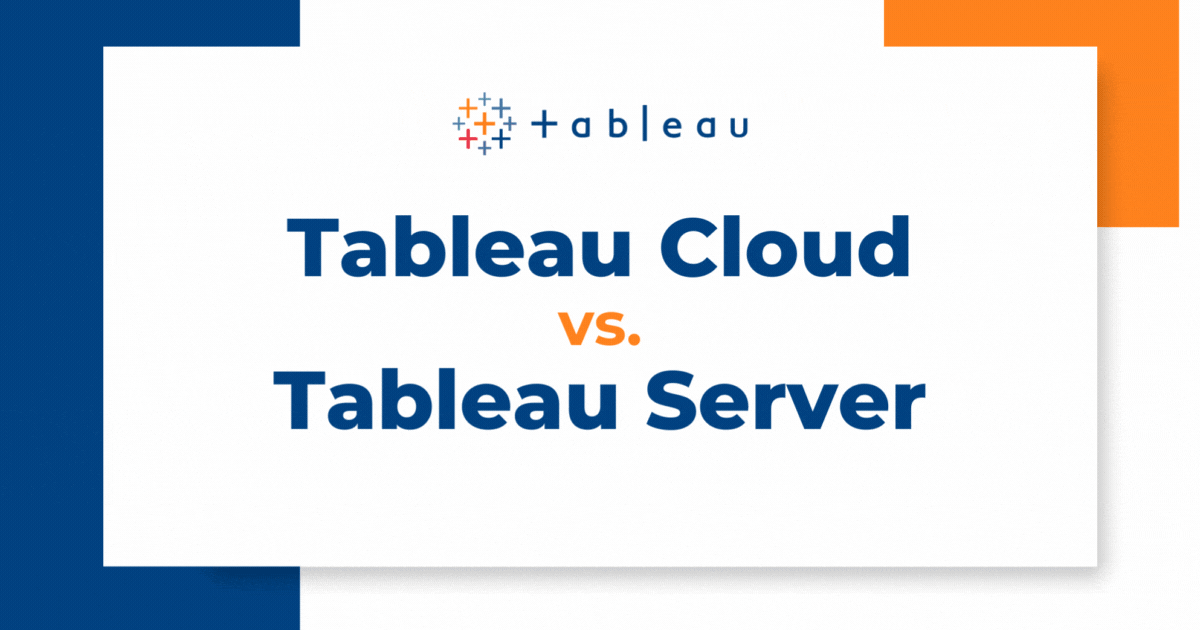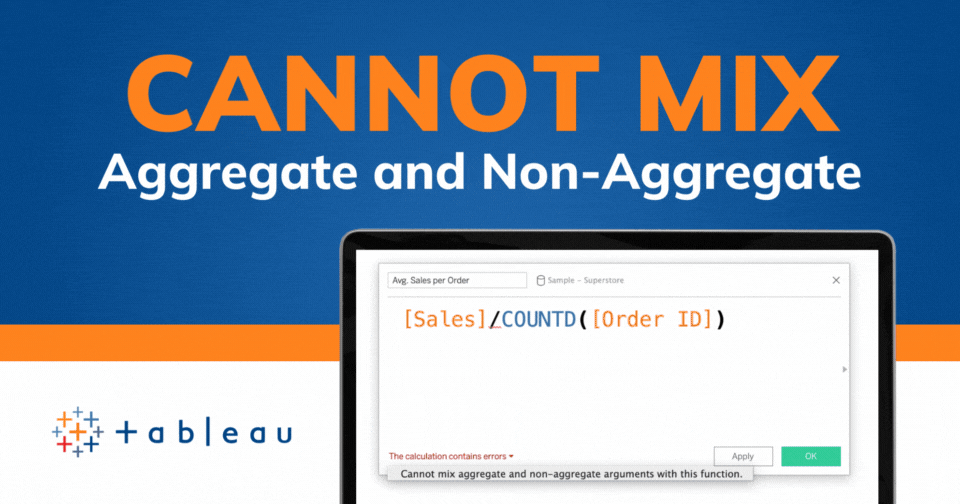Tableau Conference 2025 | Know Before You Go
If you’re a data enthusiast, analytics professional, or just someone curious about Tableau’s latest innovations, the Tableau Conference 2025 is your...
8 min read
 Luke Komiskey
Mar 31, 2023
Luke Komiskey
Mar 31, 2023

Tableau has led the data visualization and self-service analytics revolution over the past decade, providing organizations with powerful capabilities for analyzing and presenting data. Choosing the right deployment option is important to maximize the benefits of Tableau and understand the total cost of ownership.
As a Tableau Partner, our DataDrive team often encounters questions from clients about whether they should choose (or migrate) to Tableau Cloud or Tableau Server. This comprehensive blog will compare Tableau Server and Tableau Cloud, covering their features, advantages, disadvantages, and factors to consider when choosing. Let’s dive in!
Tableau Server is an on-premises deployment option that allows organizations to host and manage their Tableau reporting environment within their own infrastructure. This provides tight control over security, integration, and customization at the expense of maintaining the platform yourself.
The primary features include
Tableau Cloud, previously known as Tableau Online, is a fully-hosted SaaS solution that enables organizations to access and analyze data through a web browser without needing on-premises infrastructure. This makes it easy not only to spin up and get started, but also for users to collaborate, share insights, and access data from anywhere with an internet connection.
The primary features include
Deployment and infrastructure: Tableau Server is an on-premises solution requiring in-house infrastructure, while Tableau Cloud is a fully-hosted SaaS solution managed by Tableau.
Data security and compliance: Tableau Server offers greater control over data security and compliance, while Tableau Cloud may be less suitable for organizations with strict industry-specific requirements (although this improves each release).
Scalability and performance: Both Tableau Server and Tableau Cloud can scale to accommodate increased workloads and deliver high performance. Tableau Server would mean investing more in infrastructure, whereas Tableau Cloud auto-scales with workloads.
Integration with other tools and platforms: Tableau Server provides greater flexibility for integrating with existing IT infrastructure, while Tableau Cloud easily integrates with cloud-based platforms and can connect to on-premise systems using Tableau Bridge.
Maintenance and support: Tableau Server requires in-house IT expertise and resources for maintenance, while Tableau Cloud is fully managed and maintained by Tableau. Upgrading versions on Tableau Server would require in-house time and effort.
Cost structure: Tableau Server has higher upfront costs for infrastructure, while Tableau Cloud has a slightly higher per-user cost built into the licensing model for Tableau to host.
Accessibility and collaboration: Tableau Cloud offers easy access and collaboration from anywhere, while Tableau Server requires remote access solutions for users outside the organization's network.
Business continuity and disaster recovery: Tableau Cloud includes built-in disaster recovery and backup features, while Tableau Server may require additional planning and investment for these capabilities.
Larger organizations with existing IT infrastructure may prefer Tableau Server, while smaller organizations or those without on-premises infrastructure may find Tableau Cloud more suitable.
IT resources and expertise
Tableau Server requires in-house IT expertise for deployment, maintenance, and support, making Tableau Cloud a better option for organizations with limited IT resources.
Data security and compliance requirements
Organizations with strict data security and compliance requirements may opt for Tableau Server to maintain control over their environment. However, Tableau Cloud does offer robust security features that meet the needs of many organizations.
Budget constraints
Tableau Cloud's lower upfront infrastructure cost and subscription-based pricing may appeal more to organizations with tight budgets, while Tableau Server might be better suited for organizations willing to take on the initial hardware investment in time and money.
Integration with existing tools and systems
Organizations with existing on-premises systems may find Tableau Server's integration capabilities more fitting, while those primarily using cloud-based platforms (or actively migrating to cloud-based data systems) will prefer Tableau Cloud.
Large enterprises with complex IT infrastructure - Tableau Server may be more suitable for organizations with extensive IT resources and a need for tight control over data security and integration.
Small and medium-sized businesses with limited IT resources - Tableau Cloud is an attractive option for organizations with limited IT resources, as it eliminates the need for infrastructure management and maintenance.
Organizations in highly regulated industries - Tableau Server is often preferred by organizations with strict data security and compliance requirements.
Companies with a distributed or remote workforce - Tableau Cloud allows users to access data and collaborate from anywhere, making it ideal for organizations with remote or distributed teams.
Businesses with a mix of on-premises and cloud-based tools - A hybrid deployment may be the best solution, leveraging the strengths of both Tableau Server and Tableau Cloud to meet diverse organizational needs. This would require two completely different licensing to support users in both systems.
Salesforce, a leading CRM and cloud computing company, acquired Tableau in 2019 to bolster its data analytics offerings. With each new Tableau release, the integration and capabilities grow tighter with the Salesforce cloud-centric ecosystem - so Tableau’s product suite is following that trend. Salesforce's push for Tableau Cloud adoption is driven by its commitment to delivering cloud-based solutions that are easily accessible, scalable, and cost-effective for organizations of all sizes.
As Salesforce continues to invest in Tableau Cloud, new features and functionalities are primarily being developed for the cloud-based platform, making it an increasingly attractive option for organizations considering Tableau deployment.
Organizations may choose to migrate between Tableau Server and Tableau Cloud due to changes in infrastructure, compliance requirements, or business needs - often led by digital transformation and growing cloud datasets. The migration process involves exporting and importing data sources, workbooks, and user permissions between the two platforms. Additionally, organizations may need to test or reconfigure integrations with other tools and systems.
Migrating between Tableau Server and Tableau Cloud can present challenges such as data loss, system downtime, and user training to access migrated insights. Best practices include thorough planning, testing, and communication throughout the migration process.
DataDrive, a premier Tableau partner, has supported over 100 organizations migrating from Tableau Server to Tableau Cloud, ensuring a seamless transition and minimal disruption to business operations. The migration also creates a golden opportunity to reorganize, consolidate, and simplify Tableau content, permissions, and integrations that may have exploded over the years. DataDrive provides a range of Tableau-related services, including consulting, implementation, and training, ensuring you get the most out of your Tableau investment.
In conclusion, both Tableau Server and Tableau Cloud offer unique benefits that cater to different organizational needs. Understanding the advantages and disadvantages of each deployment option is crucial in making the right decision for your organization. As a premier Tableau partner, DataDrive is here to help guide you through this process and ensure you maximize your investment in Tableau's powerful capabilities.
Ready to take the next step in your Tableau journey? Contact DataDrive for expert advice and support on choosing the best deployment option and getting the most out of your Tableau investment.
What is the main difference between Tableau Server and Tableau Cloud?
The main difference between Tableau Server and Tableau Cloud is the deployment method. Tableau Server is an on-premise solution that requires organizations to manage their infrastructure, while Tableau Cloud is a fully-hosted, cloud-based solution that doesn't require any on-premises infrastructure.
Can I migrate from Tableau Server to Tableau Cloud or vice versa?
Yes, it is possible to migrate between Tableau Server and Tableau Cloud, depending on your organization's needs and requirements. DataDrive can assist you in the migration process, ensuring a smooth transition.
Is Tableau Cloud secure enough for my organization's sensitive data?
Tableau Cloud offers robust security features and complies with several industry standards. However, organizations with strict data security and compliance requirements may still prefer the control provided by an on-premises solution like Tableau Server.
How does Tableau integrate with Excel and other data sources?
Both Tableau Server and Tableau Cloud can connect to a wide range of data sources, including Excel spreadsheets, databases, and cloud-based platforms. This allows users to blend and analyze data from multiple sources within Tableau.
Can I use Tableau Server and Tableau Cloud together in a hybrid deployment?
Yes, it is possible to use Tableau Server and Tableau Cloud together in a hybrid deployment, allowing organizations to leverage the strengths of both solutions. This can help balance the need for control over data security with the benefits of a cloud-based solution.
What is the cost difference between Tableau Server and Tableau Cloud?
Tableau Server generally has a higher upfront cost due to infrastructure and licensing expenses, while Tableau Cloud has a lower initial investment and follows a subscription-based pricing model. The exact cost difference will depend on your organization's specific requirements.
How can DataDrive help me choose the right Tableau deployment for my organization?
DataDrive's team of experts will assess your organization's unique needs and requirements, providing guidance and support in choosing the right deployment option, whether it's Tableau Server or Tableau Cloud. DataDrive also offers implementation, training, and consulting services to help you maximize your Tableau investment.
-2.gif)
If you’re a data enthusiast, analytics professional, or just someone curious about Tableau’s latest innovations, the Tableau Conference 2025 is your...

Tableau Plus is the new premium offering from Tableau, a leading data visualization and business intelligence platform. It builds upon the...

If you've spent any time working with Tableau, you've likely encountered the dreaded "Cannot Mix Aggregate and Non-Aggregate Arguments" error. It's a...